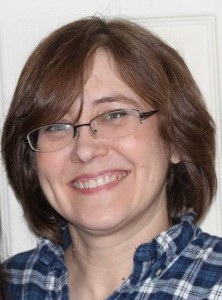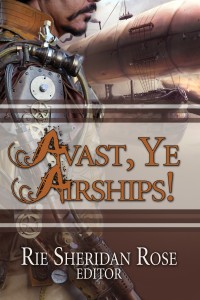When you’re on a hot streak, go with it. I’ve been interviewing some fascinating authors lately. Today I question another author who contributed to the anthology Avast, Ye Airships!, Libby A. Smith.
 Libby is a two-time winner of the Little Rock Free Press’ Literary Contest. She lives in Little Rock with her three cats.
Libby is a two-time winner of the Little Rock Free Press’ Literary Contest. She lives in Little Rock with her three cats.
Libby’s stories have appeared in Caliber Comic’s “Negative Burn” and “Dominique: Protect and Serve,” Hanthercraft Publications’ “Tandra” and “Dragonroc” universe comics and website, and Shanda Fantasy Art’s “Atomic Mouse.” Most recently her story “Newcomers” appeared in the Short Short Story issue of 4 Star Stories.
Here’s the interview:
Poseidon’s Scribe: When and why did you begin writing fiction?
Libby A. Smith: I’ve always known I was going to be a writer. My first poem was in a local newspaper when I was around 7 years old. I don’t recall seriously writing fiction until I was in college. I went on to earn a BA in English with an emphasis on creative writing.
P.S.: What are the easiest, and the most difficult, aspects of writing for you?
L.A.S.: The easiest aspect for me is writing dialogue which leads to developing the characters. I love people watching which really helps me “keep it real” no matter how strange the story itself is. There’s very colorful real life characters everywhere. Normally, I also am speaking the dialogue out loud when I write. This helps me determine how “real” it sounds.
The hardest part of writing for me is knowing where to start the story. I’ve learned to relax about it and just start writing. Many times what I intend to be the story’s end turns out to be the beginning.
 P.S.: You have a story, “Plunder in the Valley,” in the anthology Avast, Ye Airships! Without spoiling anything, can you tell us a little about the story, and what inspired you to write it?
P.S.: You have a story, “Plunder in the Valley,” in the anthology Avast, Ye Airships! Without spoiling anything, can you tell us a little about the story, and what inspired you to write it?
L.A.S.: The inspiration for the story came from the editor reminding me I had about 24 hours to submit a story! Truly! The year was a rough one, ending with a friend being found dead on Christmas Day from natural causes. He was a huge science fiction fan and had written a few stories. I was just drained physically and emotionally. When faced with the deadline, I recalled a partial story I had in my files which my friend loved. Although I ended up completely rewriting it, the original rough draft provided good “bones” and the tone I wanted.
In this case, the characters created the plot. I grew up in a small yet fast-growing town with a fantastic oral history and many colorful “old timers” around who were still going strong. Some welcomed the newcomers to town, some didn’t. Although not based on specific individuals in this case, they provided the soul to the characters and story. I’d describe it as “country humor Steampunk.”
P.S.: I’m so sorry to hear about the loss of your friend. Country Humor Steampunk sounds fascinating and original. What other genres do you write in?
L.A.S.: “Plunder in the Valley” is definitely steampunk even if it is different than the norm. When I have a story to tell, I don’t really worry about genre unless it is intended for a specific market as in this case. I’ve written southern lit, gay & lesbian, poetry, comic books, science fiction, comic book scripts, and fantasy. I’m sure I’m leaving something out!
P.S.: Are you interested in writing a sequel to that story, with some of the same characters?
L.A.S.: Definitely! It’d be a lot of fun if I get the opportunity to do so.
P.S.: What is the audience you’re aiming for in your stories?
L.A.S.: It depends on the story. But even when it seems rather specific such as ‘gay & lesbian,’ I want my work to speak to others. After all, there’s a universality to the emotions we all experience.
P.S.: What other authors influenced your writing?
L.A.S.: Every author I’ve read. The biggest single influence is Maya Angelou. I recall reading “I Know Why the Caged Bird Sings” in around fifth grade and realizing she was once a little girl in Arkansas. That’s when it dawned on me that I could really be a writer and I didn’t have to live in a big city.
I’ve never thought about this until now but another would be Lois Lenski. She was my first “favorite writer” when I was in second grade. She’d traveled the country visiting different areas to research her books like ‘Strawberry Girl.’ They told the stories of what it was like to be a child in different areas and situations. Each time I read one of her books, I thought, “Wow! This could be me if I’d been born there.’
Yes, it is odd that they aren’t science fiction or fantasy authors. Quite a few did and do influence me like Stephen Donaldson, Arthur C. Clarke, and so forth. But a good story is a good story no matter the genre.
P.S.: What is your current work in progress? Would you mind telling us a little about it?
L.A.S.: To be honest, nothing! I’m also an actor and have been auditioning a lot lately. This is on top of a full time day job and being extremely involved in my church’s music ministry. I have bits and pieces of stories started as well as formulating in my head, I just haven’t serious started working on any particular one.
Yet.
Poseidon’s Scribe: What advice can you offer aspiring writers?
Libby A. Smith: Remember to live. Making a living only from writing is very hard and, believe me, it becomes too much like work. If you find another way to make a living wage, you’ll find writing is easier since you don’t have to worry as much about the yucky things like shelter, food, a working computer, etc. I used to hang around science fiction conventions with a group of folks about my age who’d also just broken into “published writing.” Those who quit their day jobs eventually stopped writing from the stress of surviving. I kept plugging along in the mundane world and am still writing.
If all you focus on is writing, you aren’t living. Your stories and characters will be less “real” because you aren’t experiencing real life. You need to mingle with people or at least get out and observe them. Ease drop in public places such as grocery stories. Go to a park with a snack and just watch people around you. Volunteer somewhere that gets out and among people other than your immediate family and friends. Hang out occasionally with others outside your writing buddies. You can’t write believably about the world—or any world—without going out to discover what makes life an adventure.
Every person is a character in a story. Every life event is a plot. Everyone truly does have a story.
Thanks for inspiring the readers of Poseidon’s Scribe today, Libby! Fans can find out more about Libby A. Smith on Twitter, or on Facebook.
Poseidon’s Scribe
